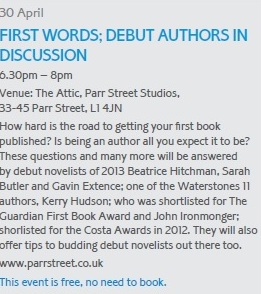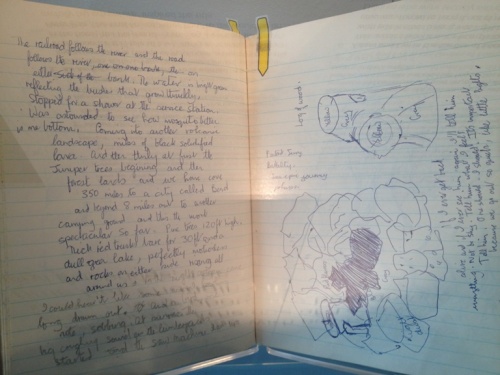In the last few years I have become increasingly aware that blurbs can be a funny thing, sometimes they exaggerate and occasionally they just completely portray a different story from the book you actually read (though to be fair this could be the way in which you read the blurb I suppose). So in the last few years I have given up in the main. However there are times when a list of books is released and you have to find out more about the individual titles, this was the case when I first heard of Jenni Fagan’s debut novel ‘The Panopticon’ when it was announced as one of the Waterstones 11 last year. It sounded quite unlike any novel I had heard of with a fifteen year old ‘counter-culture outlaw’ who finds herself in The Panopticon escaping from ‘the experiment’. When we chose the title for The Readers Book Club this month I was looking forward to trying my hand at what promised to be my first delving into a sci-fi dystopian novel in some time, only it’s not a sci-fi dystopian novel, it is something quite different from that.

**** William Heinemann, hardback, 2012, fiction, 336 pages, kindly sent by the publisher
At fifteen years of age Anais Hendricks is someone who society has already given up on. As we meet her she has finally been found by the police who swiftly take her to The Panopticon, a home for severe young offenders, where she arrives covered in blood and with the suspicion of having put a policewoman into a coma.
From here we learn more about her current situation, her past home which may have lead her into the world of drugs, underage sex and crime (though many believe she is simply bad through and through, no further explanation needed). We also learn how Anais believes that she is being watched by ‘the experiment’, faceless beings who look human yet have no noses and remain nondescript, who she believes created her on a petri-dish just to see how many awful things a human can undertake.
Jenni Fagan asks a lot from her reader from the start of ‘The Panopticon’– and in doing so takes a lot of risks. The book is filled with swearing, violence, drug taking and underage sex from pretty early on (and it gets darker from here on in). You also find yourself, or this reader did anyway, not quite sure if you like Anais and if in fact she might just be a bad person through and through. Yet Fagan’s gamble pays off if you bear with it, a few chapters in and not only did I like and empathise with Anais but I enjoyed spending time with her. I found one minute she would make me laugh, then say something which would almost break your heart.
“…Also, there is the second time that you have stolen a minibus from outside Rowntree High School, but this time you,’ the woman scrolls her pen down the report in front of her, ‘drove it into a wall?’
‘I drove it intae the wall both times.’
‘Something was different the second time, Miss Hendricks?’
She raises her eyebrows, stops, like she is asking a pub-quiz question. The other three panel members look to see what I’m gonnae say.
‘The second time it was on fire,’ I respond after a minute.
‘Correct.’
Brilliant. A correct answer. What do I win? The woman’s running her eye up and down the charges again, looking for something. I hate. This chair. Their faces. That shite gold clock on the wall.”
She is a real conundrum. One moment she dreams of a quite life in Paris, the next she wants to kick someone’s head in, one minute she is reading a book about the supernatural with a naivety that is younger than her years, the next she is telling you about her last drug binge. She is an incredibly unreliable narrator and yet you cannot help but warm to her. Fagan plays a top trump here with the fact that Anais lets no-one into her life, apart from us the readers, which I found a really cleverly written aspect of the book.
“Open my book, it’s mostly vampire stories just now, before that it was witches. I could handle being a vampire, an evil one with mansions everywhere. I’d fly, and read minds, and drink blood, until I could hear wee bats being born right across the other side of the world. I hear other people’s thoughts when I’m tripping, ay. I dinnae really know if it is thoughts actually, maybe it’s just voices. They urnay my thoughts – I know that much. It’s like tuning into a radio frequency that’s always there, but when you’re tripping you cannae tune it back out. I get voices in my head that urnay mine, and I see faces no-one else sees, but mostly it’s just when I am tripping, so I mustn’t be totally mental in the head yet.”
So what of ‘the experiment’, because after all this was what had intrigued me so much about the book and what I was hoping to be delved into. Well, to be honest, it wasn’t in the book as much as I was expecting or indeed would have liked. In fact if it hadn’t been for Anais, her narrative and her story, the book probably would have really disappointed me a little bit. Occasionally a sense of these mysterious men and the plan that Anais thinks they have for her appear on the periphery or are referred to, along with the rumour that Anais’ mother was only seen once smashing through a window of an asylum – where she promptly gave birth and escaped again – on a winged cat, yet I thought Fagan could have gotten away with doing it a lot more, making the reader question Anais’ reality and sense of reliability, even more.*
“I dinnae say I’ll volunteer to help some old lady with her shopping, and her cleaning, and if I’m really fucking lucky she’ll take me under her wing and get tae like me and feed me apple pie and gin – and tell me her stories about the good old days. Those urnay the things I say.”
As I mentioned, had Anais and her story not been the whole story, and therefore what made an impressive and thought provoking book (you cannot call a book like this ‘enjoyable’), then I might have been a tad disappointed by ‘The Panopticon’. However as it was I was bowled over by it. It is a confronting and occasionally horrifying novel that will make you feel as deeply uncomfortable as it will make you laugh – and that is all down to the strength of Jenni Fagan’s writing and the heroine that she creates. It is also a book that leaves you with a huge question but one I think I should leave those of you who go on to read it, and I do think you should, to discover and try and answer for themselves, I myself am still thinking about it all.
*Interestingly when recording The Readers Book Club on ‘The Panopticon’ last week with two sci-fi fans I was amazed to see that they didn’t think the experiment was real, where as I (the ‘literary’ head) completely did. But I think you are meant to question this throughout anyway. they didn’t think the experiment was real, where as I (the ‘literary’ head) completely did. But I think you are meant to question this throughout anyway. You can listen to that discussion here.
Who else has read ‘The Panopticon’ and what did you make of it? Would you call it ‘literary’, ‘sci-fi’, ‘magical realism’ or, as I think, ‘gothic’? Does it even matter? Which other books have you read that had a blurb that didn’t quite match the book that you ended up reading? Are you like me and find you tend to ignore blurbs on the whole?
































